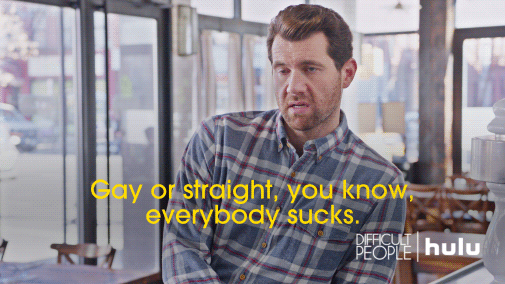
The Hulu series was canceled after three seasons. Here’s why it’s hard to say goodbye.
The lovable unlikeable characters.

The title says it all: Julie Kessler (Julie Klausner) and Billy Epstein (Billy Eichner) are — well, difficult, and even that might be an understatement. At their worst, these characters are selfish, unbearable dicks. And yet, they’re also impossible not to love. There have been plenty of TV shows about morally compromised antiheroes — almost all of them straight white dudes — and you ostensibly root for them despite their shady behavior. What made Difficult People special is that it encouraged you to fully embrace its occasionally indefensible leads: You didn’t just root for Julie and Billy, you wanted to be their best friend, too.
That’s a testament to the writing as well as the performances by Klausner and Eichner, and the chemistry between them. And it extends to the other difficult people on the show: Julie’s self-absorbed mother Marilyn (Andrea Martin), Billy’s most loathed coworker Matthew (Cole Escola), and his somewhat less objectionable coworker Lola (Shakina Nayfack) — the only 9/11 truther you’d actually want to spend a day with. It’s a real challenge to craft characters that are both believably hateful and undeniably adored, and Difficult People made it look easy.
Hulu
The friendship at its core.
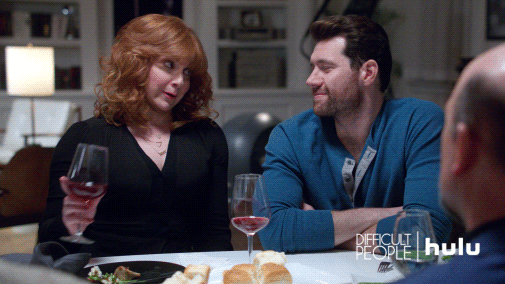
There were plenty of relationships depicted on Difficult People — friendship, familial, and romantic — but the show always came down to the relationship between Julie and Billy. This wasn’t the first TV series to prioritize friendship over romantic entanglements, or even the first show that centered on the unique bond between a gay man and his straight female best friend, as the resurgence of Will and Grace reminds us. But what made Difficult People distinctive was the way it depicted the beautiful bond of shared misanthropy, a friendship based on hating literally everybody else. If that doesn’t sound special to you, you’ve probably never experienced it.
OK, the truth is in real life relationships founded on shared antipathy can be pretty toxic. What made Billy and Julie’s friendship special is that they clearly really loved each other — note the very real emotions when Billy decided to move to Los Angeles. It was aspirational. We’ve all felt like we are the only sane person in a world of assholes: Difficult People showed us that there was at least one other worthwhile human out there to keep us company despite the bullshit, and fave our pettiest tweets.
Hulu
The niche humor.
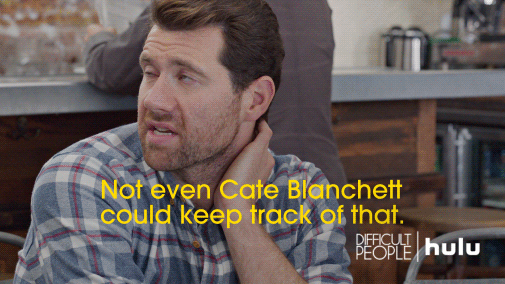
Frankly, it’s amazing (and deeply gratifying) Difficult People lasted as long as it did with a comedic sensibility that seemed highly specific, to say the least. That was the beauty of it: In a television culture that favors mainstream sitcoms with mass appeal, this series attracted a smaller, gayer, more pop culture–savvy audience. There was something thrilling about watching a show that alternated between Sondheim references and digs at Jill Zarin, namely the fact that it felt like a validation of the personal obsessions that have kept the audience — Bravo-watching, Merrily We Roll Along–quoting losers — occupied at brunches for years.
Part of the joy of watching Difficult People was the sense of overdue relief — it’s unbelievable that it took this long for a series to write in jokes about the supposed rivalry between Bernadette Peters and Patti LuPone — but it was also that the show seemed designed without any regard for that aforementioned mainstream. Yes, in many ways, it was a show for a bubble, but it’s a bubble that is still underserved, if only because it’s nearly impossible to compete with the much broader success of long-running TV ratings juggernauts. No matter. For a time, there was a show that didn’t care if you got all the Smash jokes: Maybe it wasn’t for you.
Hulu
The unabashed queerness.
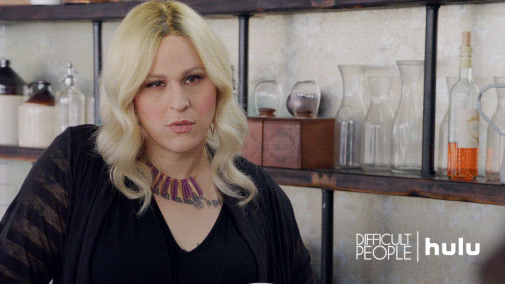
Difficult People was one of those beautiful shows that didn’t seem to concern itself with straight men at all. Oh, sure, they could watch it — they might even laugh! — but in the world of Difficult People, they were an afterthought. Of the six main characters, only one was a straight cis man, Julie’s put-upon boyfriend Arthur (James Urbaniak). And while Arthur was one of the few truly kindhearted people on the show, he was far from a paragon of performative masculinity. The straightest dude Difficult People had to offer was also its most sensitive and submissive character. (This is the future that liberals want.)
Populated by gay men from the get-go, Difficult People broadened its spectrum of queerness by introducing Lola in Season 2. While television has made significant strides in trans representation over the past several years, trans characters played by trans actors are still a relative rarity. Losing Lola — and Shakina Nayfack’s incomparable performance — is a real shame. There is no one else like her on TV, and it’ll probably be a while before another trans conspiracy theorist graces our screens again. As with all the LGBT characters on Difficult People, Lola’s queer identity was essential but not her only defining characteristic. Nayfack will surely move on to even greater things, but let’s pour one out for Lola.
Hulu
The theater people.
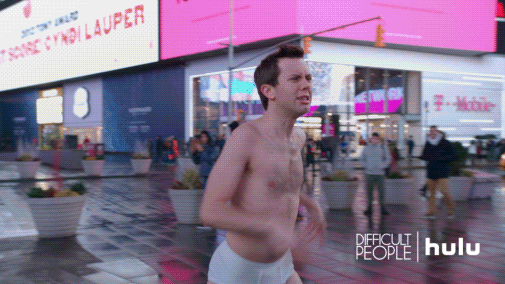
We’re down to one Law & Order franchise, and that means limited opportunities for New York theater actors. (If The Good Wife hadn’t spun off into The Good Fight, this would be an even more serious crisis.) Difficult People didn’t just cast well-known Broadway actors but more under-the-radar talent, people like Nayfack and Escola, who have long been favorites of New York’s downtown theater scene and are now crossing over into the mainstream. Klausner, a long-term member of this scene herself, created roles that showcased these actors, who have now been exposed to an audience that realizes they’ve been missing out for years. We are all better for it.
And, of course, Difficult People also allowed for some bigger name theater cameos: Nathan Lane and Lin-Manuel Miranda, among them. This was a series steeped in a genuine love for theater, which played out not only in casting but also in storylines and, again, the nichest of niche jokes. For those of us who are similarly theater-oriented and who still haven’t really recovered from the cancellation of Smash, that meant something. What other show is going to make the bold statement that people who think Sondheim’s music isn’t “danceable or very catchy … can go fuck themselves”? Difficult People was a series that pandered to the queers, the outcasts, and the theater trash for once; we loved every minute of it.
Hulu

